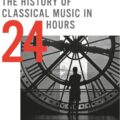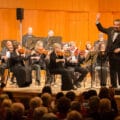Apr 17, 2017
Our Sagging, Flabby Attention Spans

Anne Quito, design and architecture reporter for Quartz recently wrote an excellent article, headlined: The classical music concert is a vital workout for our sagging, flabby attention spans.
Anne puts her finger on a sina qua non for receiving the most pleasure from music listening. . .increasing our attention spans. What I found fascinating is the perspective from which she writes. Self identified as a member of the “so-called multitasking generation (a.k.a. GenM)” she goes on to say: “My default mode is to start two or more things at the same time, and that approach had compromised my ability to finish novels, TV shows and projects efficiently.” Precisely!
Two favorite quotes are: “Over time, I noticed that showing up at concert halls with some regularity has given me back the capacity for single-mindedness, or monotasking. . .” (emphasis mine). And, “In the age of hyper-connectivity and multi-tasking, staying focused during a two or three hour classical music performance can feel like a workout.”
As Anne tells it, she had the good fortune of having a classical music-loving godfather who introduced her to symphonic concerts. I think it’s significant that she recognizes that classical music listening has had such a profound effect on her ability to focus. That is so important. That issue alone would make a required classical music listening course for all students a valuable addition to school curriculums nationwide.
I would add that at The Discovery Orchestra, we actually offer some practical assistance in lengthening the attention span. How? By helping listeners notice more musical detail, which goes a long way in relieving that ‘workout’ sensation.
I’m reminded of an experience with a class of young boys with whom I presented a listening lesson on the Overture to Handel’s Royal Fireworks Music. They listened politely to the first play-through, and then we began to explore the details of this wordless, abstract music. After the ‘final’ play-through, I asked them what was different. One enthusiastic student could hardly contain himself as he shouted: “It was so much shorter!” Knowing of course that exactly the same amount of time had transpired, I asked: “Why?” Another participant said without missing a beat: “We noticed so much more.”
Anne concludes: “At the symphony, the only task is to tune in to one beautiful spectacle at a time.” Why? It will definitely help you strengthen your mental focusing muscles. And from our perspective at The Discovery Orchestra, doing so just might also cause you to have some of the most riveting, profound – perhaps even shattering – encounters with your deepest emotional core that you can imagine. . . ‘peak experiences’ as described by Abraham Maslow. Whether in the safety of the concert hall or the privacy of our headphones, these deep dives into ourselves are wondrous. . .and beneficial!









